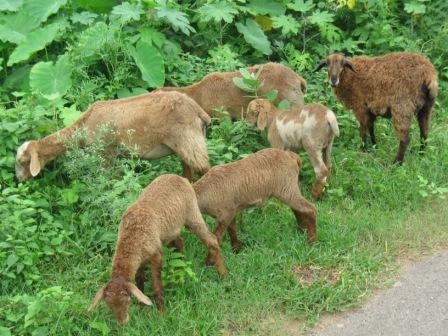Kendrapara: The conservation of a threatened breed of sheep found in Kendrapara district and conferred with the ‘rare and singular’ species tag by the Centre has been given a short shrift by the state government, sources said Sunday.
The National Bureau of Animal Genetic Resources (NBAGR) has accorded genetic recognition to this breed of sheep, locally known as ‘kuji mendha’, sources informed.
The NBAGR has conferred genetically rare status carrying FakeB gene on this sheep. The state government should carry out conservation of this domestic animal and conduct more research, the body had stated said.
This is indeed a rare type of sheep and gives multiple births. This variety of sheep usually is of small size and the body is covered with coarse hair. The average adult sheep weighs around 18-20 kg. These animals are mainly domesticated for production of mutton. The other product of economic importance is their skin. They are well adapted to high ambient temperatures, high humidity and rains. Proper conservation and research on this animal can help boost the livelihood of the residents as well as the economy of the district which is primarily dependent on agriculture, farmers and local intelligentsia said.
The Odisha University of Agriculture and Technology (OUAT) in Bhubaneswar has taken up the conservation and research of Binjharpuri breed of cows which has also been conferred a ‘special’ tag by the Centre. However, it has been neglecting conservation of ‘Kuji mendha’ and not much is being done in this regard, locals alleged. Recently 60 sheep of this breed were killed by unknown animals, but the farmers did not receive any compensation as the sheep lacked insurance cover.
People associated with the breeding of this variety of sheep alleged that lack of food is harming the animal. Encroachments have destroyed substantial grasslands leaving very little for the sheep to feed on. As a result investing on ‘kuji mendha’ is not a viable source of income anymore, locals said. Sheep farmer Niranjan Parida of Kansar village asserted that breeding of cattle, goats and sheep is essential for the growth and development of rural economy. These animals are of help during any disaster or problem. He added that banks do not provide any loans for developing this breed of sheep and also no treatment facilities are available.
Senior resident Prasanna Kumar Dhal said that the Centre is implementing Rashtriya Krushi Yojana while the state government is implementing various schemes for the development of animal resources. However, these remain only in paper as the population of domestic animal is declining in the district every year. According to the 2000 animal census, the district had 14,885 sheep. However, numbers have reduced by 10- 12% at present, locals opined. Sheep farming will get a boost if the district administration can arrange for training, loan, marketing facilities and mandi, they added.
The economy of the district is dependent on agriculture after the Super Cyclone. Approximately 47 per cent residents in this district are dependent on domestication of animals for their livelihood. Zoologist Devi Prasad Sahu said the ‘kuji mendha’ can give birth to three to four lambs at a time and hence is a good source of income.
When contacted, chief district veterinary officer (CDVO) Dr Deepti Mohapatra said there are no special plans for the conservation of ‘kuji mendha’ variety of sheep at present.
PNN
